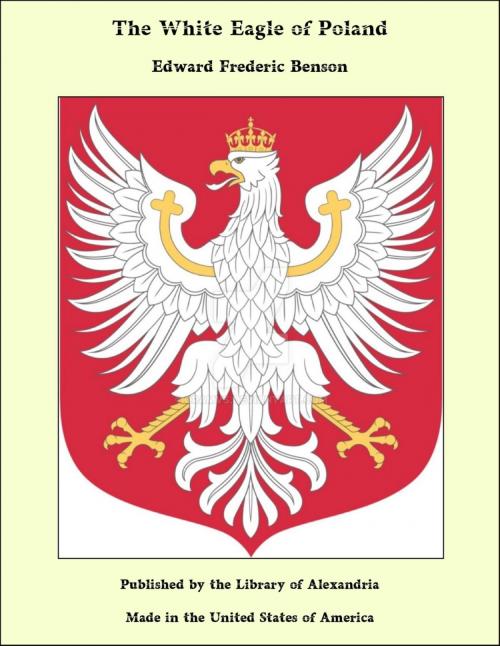The White Eagle of Poland
Nonfiction, Religion & Spirituality, New Age, History, Fiction & Literature| Author: | Edward Frederic Benson | ISBN: | 9781465625571 |
| Publisher: | Library of Alexandria | Publication: | March 8, 2015 |
| Imprint: | Language: | English |
| Author: | Edward Frederic Benson |
| ISBN: | 9781465625571 |
| Publisher: | Library of Alexandria |
| Publication: | March 8, 2015 |
| Imprint: | |
| Language: | English |
At the beginning of the war it is probable that few people of average education had any very accurate idea even of the place which the Kingdom of Poland occupies on the map of Europe, and to the English mind it but belonged to that nebulous system of geographical expressions such as Bohemia, Galicia or Serbia, indefinite, shadowy states towards the East of Europe, concerning which it was necessary to consult an atlas. Fewer still knew anything about its past history or its present condition, beyond, perhaps, that it was connected with Russia, since they mildly remembered that the Tsar of all the Russias was also King of Poland, much as the German Emperor was also King of Prussia. And fewest of all even among the skilled and well-informed augurs of political omens saw or guessed that before the war was over Poland would have acquired so huge a significance as it, and the problems connected with it, imply to-day. For to-day the majority of far-seeing and large-minded statesmen, both in England and the Allied countries, are perfectly well aware that the eventual solution of the question of Poland, which at present is in joint German and Austrian occupation, will supply a fair and adequate criterion as to which group of belligerents may be considered to have won the European war. Germany knows that no less well than we, and though her armies might be beaten in the field, and though she might be compelled to accept a peace without other annexations, coupled with the retrocession of Alsace and Lorraine to France, with the restoration of Belgium and the re-establishment of Serbia, if she could make an arrangement about Poland and the problems of her eastward expansion which are bound up with it satisfactory to her own statesmen, she would be entitled to consider herself at any rate undefeated. For the economic and political victory she would have won would fully compensate for a disaster to her arms, and in ten years or less she could be the aggressor in another war which would in all probability leave her mistress of the world. This may sound an exaggerated menace, but it is in truth a sober and considered statement of fact, for the policy known as the Mittel-Europa policy would have achieved a signal victory of supreme importance which would be certain to lead to further success and the ultimate realization of its complete aims. Intimately bound up with the destiny of Poland is that of Bohemia: this does not, however, except marginally, fall within the scope of this book. Broadly speaking, there are two parties in Germany which by different methods seek the attainment of world-power. They are in harmony with each other in that each cordially approves of the other’s policy as an auxiliary of its own. The Pan-German party seek the expansion of the German Empire and the overthrow of the British primarily by conquest and annexation westward, while the Mittel-Europa party (with Hindenburg to help) seek the same expansion and the same overthrow by an easterly progression. Thus the Pan-Germans proclaim as a sine-qua-non of peace-terms the retention of Antwerp and of Alsace and Lorraine by the Central Powers (in other words, Germany), and the reduction of Belgium, under the guise of a German-protected autonomy, to the position of a German province. The Mittel-Europa party, on the other hand, aim at the expansion and extension of German “spheres of interest” (or whatever meiosis they care to adopt as synonymous with the simpler word “conquest”) eastward, hoping to bring about the realisation of the same “far-off event” by the direct menace to Egypt and India.
At the beginning of the war it is probable that few people of average education had any very accurate idea even of the place which the Kingdom of Poland occupies on the map of Europe, and to the English mind it but belonged to that nebulous system of geographical expressions such as Bohemia, Galicia or Serbia, indefinite, shadowy states towards the East of Europe, concerning which it was necessary to consult an atlas. Fewer still knew anything about its past history or its present condition, beyond, perhaps, that it was connected with Russia, since they mildly remembered that the Tsar of all the Russias was also King of Poland, much as the German Emperor was also King of Prussia. And fewest of all even among the skilled and well-informed augurs of political omens saw or guessed that before the war was over Poland would have acquired so huge a significance as it, and the problems connected with it, imply to-day. For to-day the majority of far-seeing and large-minded statesmen, both in England and the Allied countries, are perfectly well aware that the eventual solution of the question of Poland, which at present is in joint German and Austrian occupation, will supply a fair and adequate criterion as to which group of belligerents may be considered to have won the European war. Germany knows that no less well than we, and though her armies might be beaten in the field, and though she might be compelled to accept a peace without other annexations, coupled with the retrocession of Alsace and Lorraine to France, with the restoration of Belgium and the re-establishment of Serbia, if she could make an arrangement about Poland and the problems of her eastward expansion which are bound up with it satisfactory to her own statesmen, she would be entitled to consider herself at any rate undefeated. For the economic and political victory she would have won would fully compensate for a disaster to her arms, and in ten years or less she could be the aggressor in another war which would in all probability leave her mistress of the world. This may sound an exaggerated menace, but it is in truth a sober and considered statement of fact, for the policy known as the Mittel-Europa policy would have achieved a signal victory of supreme importance which would be certain to lead to further success and the ultimate realization of its complete aims. Intimately bound up with the destiny of Poland is that of Bohemia: this does not, however, except marginally, fall within the scope of this book. Broadly speaking, there are two parties in Germany which by different methods seek the attainment of world-power. They are in harmony with each other in that each cordially approves of the other’s policy as an auxiliary of its own. The Pan-German party seek the expansion of the German Empire and the overthrow of the British primarily by conquest and annexation westward, while the Mittel-Europa party (with Hindenburg to help) seek the same expansion and the same overthrow by an easterly progression. Thus the Pan-Germans proclaim as a sine-qua-non of peace-terms the retention of Antwerp and of Alsace and Lorraine by the Central Powers (in other words, Germany), and the reduction of Belgium, under the guise of a German-protected autonomy, to the position of a German province. The Mittel-Europa party, on the other hand, aim at the expansion and extension of German “spheres of interest” (or whatever meiosis they care to adopt as synonymous with the simpler word “conquest”) eastward, hoping to bring about the realisation of the same “far-off event” by the direct menace to Egypt and India.















